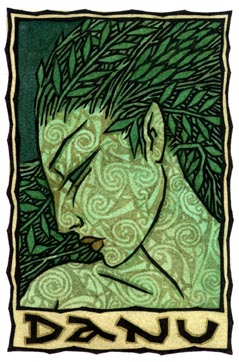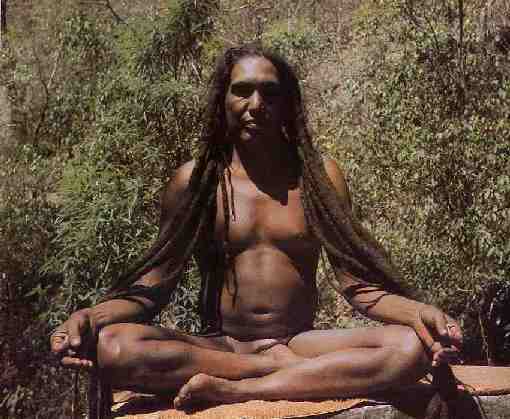
Welsh-Irish Traditions of Folklore and Mythology
The mother goddess of Ireland was considered to be the goddess Dana who gave her name to the Tuatha de Danann, or the People of the goddess Dana. In Wales, another mother goddess of the same position was known as Don. This article will demonstrate the relationship and commonality held between these two goddesses in an attempt to support and explain Heathen traditions which span both Irish and Welsh culture.
Within Wales, Don held the position of the mother of the gods and gave her name to the children of Don (MacKillop: 130). In the Welsh Triads, the husband of Don is said to be Beli Mawr (ibid.). The descent of many powerful royal families in Wales have claimed that their lineage is derived from Beli and Anna, the `Ancient One' of Wales, that were known together as the Coil Hen (Pennick: 102). The use of this lineage has stemmed from both Heathen and Christian times (ibid.). The actual name Don appears to be a form of the Welsh Donwy which can be directly link phonetically to the Irish Danann (Rees: 52). This term is evident in the names of a few rivers in Wales such as the Trydonwy and the Dyfrdonwy (ibid.). The Dyfrdonwy is identified as one of the `three wells of the ocean' and according to a late text `comes through the veins of the mountains like the flinty feast made by the King of kings.' (ibid.).
The equivalent goddess was called Dana in Ireland. Dana is connected linguistically to the Old Irish word "anai" which means wealth (O'Hagain: 151). In medieval manuscripts she is called Ana (Maier: 12), later known as Danand (O'Hogain: 151), and finally as Danann (Maier: 17). The mutation of Ana to Dana was the result of a prosthetic "D" being added to her name (MacKillop: 130). The Irish goddesses Dana and Danu were not initially the same goddess, but instead appear to be merged together via oral tradition (Green: 77).
Ana held deep associations with two mountains located within Co. Kerry in Ireland which were called the Da' Chich nAnann, or the Paps of Ana (Green: 30). Early texts refer to Ireland as `iath nAnann' or the land of Ana (O'Hogain: 152). Many families within Ireland claim to be descended from this goddess (Squire: 245).
Both the Irish Dana and Welsh Don are considered to be the mother of the Children of Light. In early manuscripts they are both known as either Ana or Anna, and are related to the prosperity of the land itself. Dana is derived from the Old Irish "anai" meaning wealth and Don is the sister of Math whose name means wealth (Rolleston: 350).
Although it must be remembered that the name of a goddess is specific to that goddess, we can still examine the root of Ana and therefore illustrate the spread and integration of her worship in both Ireland and Wales. Other examples of goddesses which exhibit this same root are as follows:
Aine
South Munster (Ireland) - Cnoc Aine
Her day of celebration was on St. John's eve. She is considered the first ancestress by many famous Irish families (Squire: 245).
Annis
British Isles
Also called the Blue Hag, she is said to suck the blood from children. This is a very late period form of Ana (Ann and Imel: 501).
Aynia
Ulster (Ireland)
(Squire: 245)
Black Annis
Leicester (England) - Dane Hills
She is depicted as a black cat that devours children and is fairly late period. In her more temperate aspects she is referred to as Gentle Annie (Ann and Imel: 505).
Boann
Ireland - Boyne River
Her name means "she who has white cows" (MacKillop: 40). Ptolemy mentions a possible earlier form of her name, Bou-vinda (ibid.). She was the wife of Nechtain, and in other stories of Elcmar, who had an affair with the Dagda and by him conceived the child Aengus (MacKillop: 157). Her pregnancy was hid by the Dagda who cause the sun to stay in its place for nine months until the child was born and could be fostered by Midir (Green: 44).
Buanann
Ireland, Wales, and Scotland
She is considered to be the mother of heroes, and her name means "the lasting one" (MacKillop: 56). With Scathach, she taught martial arts at a school for warriors (Ellis: 54). She was given the honorary title of, the "mother of the Fianna" by Fionn and the Fianna. The Morrighan was referred to as Buan, the male form of the name, in the Tain Bo' Cuailgne (MacKillop: 56).
Resources
Ann, Martha and Imel, Dorothy Myers. "Goddesses in World Mythology." (Santa Barbara, CA: ABC-CLIO, 1993).
Ellis, Peter Berresford. "A Dictionary of Irish Mythology." (Santa Barbara, CA: ABC-CLIO, 1987).
Green, Miranda J. "Dictionary of Celtic Myth and Legend." (London: Thames and Hudson, 1992).
Jones, Prudence and Pennick, Nigel. "A History of Pagan Europe." (London: Routledge, 1995).
MacKillop, James. "Dictionary of Celtic Mythology." (Oxford: Oxford University Press, 1998).
Maier, Bernhard. trans by Cyril Edwards. "Dictionary of Celtic Religion and Culture." (New York: Boydell Press, 1997).
O'Hogain, Daithi. "Myth, Legend, and Romance: An Encyclopedia of the Irish Folk Tradition." (New York: Prentice Hall Press, 1991).
Rees, Alwyn and Rees, Brinley. "Celtic Heritage: Ancient Tradition in Ireland and Wales." (New York: Thames and Hudson, 1961).
Rolleston, T. W. "Celtic: Myths and Legends." (London: Senate, 1994).
Squire, Charles. "Celtic Myths and Legends." (New York: Portland Hose, 1997).
By: Aisling Bronach of House Shadow Drake
.






